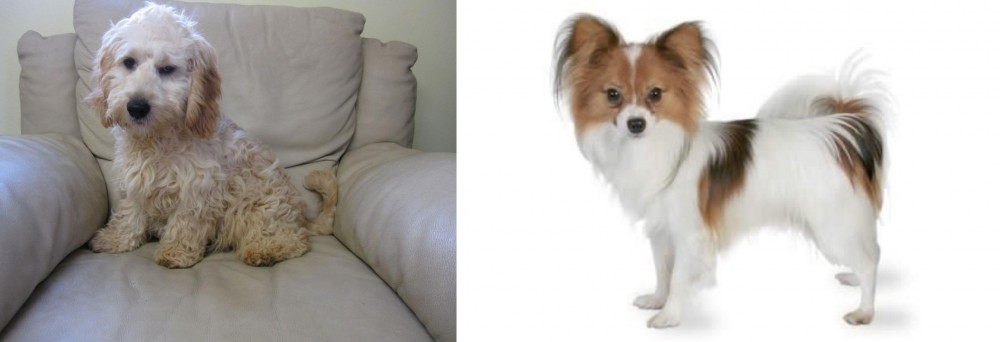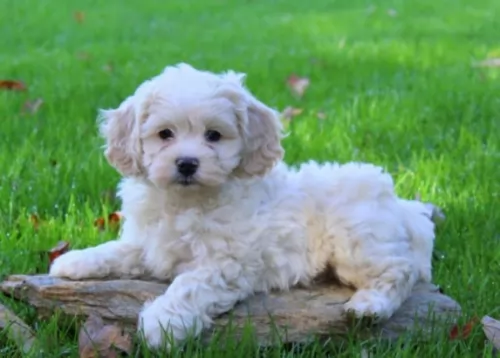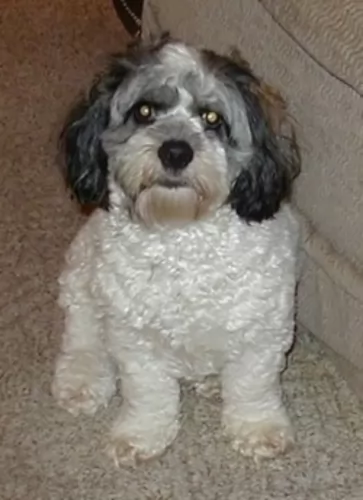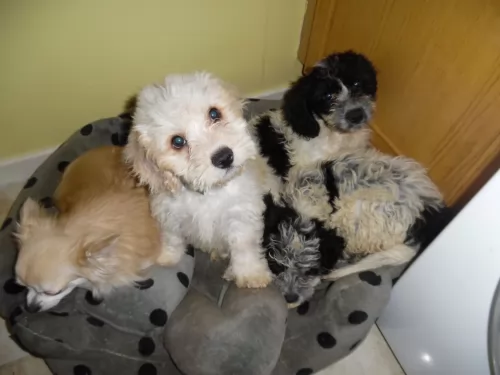 Petzlover
Petzlover Cockachon is originated from United States but Papillon is originated from France. Cockachon may grow 11 cm / 5 inches higher than Papillon. Both Cockachon and Papillon are having almost same weight. Both Cockachon and Papillon has same life span. Cockachon may have more litter size than Papillon. Cockachon requires Low Maintenance. But Papillon requires Moderate Maintenance
Cockachon is originated from United States but Papillon is originated from France. Cockachon may grow 11 cm / 5 inches higher than Papillon. Both Cockachon and Papillon are having almost same weight. Both Cockachon and Papillon has same life span. Cockachon may have more litter size than Papillon. Cockachon requires Low Maintenance. But Papillon requires Moderate Maintenance
 The Cockachon is not a pure bred dog but rather a cross between the Cocker Spaniel and the Bichon Frise. Very little if anything is known about who initially developed the Cockachon. It is known that the International Designer Canine Association (IDCA)registered and recognized the hybrid in 2009.
The Cockachon is not a pure bred dog but rather a cross between the Cocker Spaniel and the Bichon Frise. Very little if anything is known about who initially developed the Cockachon. It is known that the International Designer Canine Association (IDCA)registered and recognized the hybrid in 2009.
It is obviously a relatively new cross breed. The hybrid is also recognized by the American Canine Hybrid Club (ACHC), International Designer Canine Registry (IDCR) and the Designer Dog Kennel Club (DDKC).
 With his eye-catching butterfly-look-alike feathery ears, the Papillon, also called the Continental Toy Spaniel or the Squirrel Spaniel, is one of the oldest of the toy spaniels.
With his eye-catching butterfly-look-alike feathery ears, the Papillon, also called the Continental Toy Spaniel or the Squirrel Spaniel, is one of the oldest of the toy spaniels.
You can see that the history of the Papillon goes very far back as the dog has been depicted in early works of art dating back to the 1500s. They were at first bred for the companions of noblewomen, appearing in many paintings where they are seen in royal courts.
The AKC registered its first Papillon in 1915. It is believed that the dog hails from France and Belguim. The Papillon was first recognized by the AKC in 1935 and the Papillon Club of America was also formed.
 The Cockachon is a cute, little dog very popular in current times. He is small, compact, dark eyes, a round head and black nose. He has a baby face and fluffy hair. It has a furry tail and a blunt muzzle.
The Cockachon is a cute, little dog very popular in current times. He is small, compact, dark eyes, a round head and black nose. He has a baby face and fluffy hair. It has a furry tail and a blunt muzzle.
The Cockachon is a mix between the American Cocker Spaniel and the Bichon Frise. In order to get a better idea of what the hybrid can look like just look at the individual parents. The American Cocker Spaniel is a small dog with a short muzzle and domed head. It is in the Sporting Group, but it is the smallest member of the group. He has a compact, sturdy body and though domed his head is refined.
The Cocker’s stance includes a sloping topline, muscular hindquarters and strong shorter legs adds up to a balanced canine. The coat can be in a wide variety of colors including liver, golden, black, and red. Also, it could be liver and tan, black and tan, roan or tricolors. So, while the Bichon Frise is always white the Cockachon can be any of these colors including white. The types of coats that the Cocker Spaniel and the Bichon Frise have are very different as well.
The Bichon Frise is also a small dog, actually smaller than the American Cocker. The Cockachon usually ends up being about the size of the Bichon at 5-10 kg in weight and 23-30 cm in height. The skull of the Bichon Frise is round rather than domed and the muzzle is also rounded. The tail is long and curly while the Cocker would usually have a cropped tail. The nose and eyes of the Bichon Frise are black and its hair is dense and curly. Unlike the Cocker Spaniel it barely sheds.
Many Cockachon have floppy ears, curly coats and come in any variety of colors though many, many are white.
 Papillon means 'butterfly' which refers to the dog's fringed upright ears. You also get the floppy eared variety which is known as phalene, meaning 'moth'.
Papillon means 'butterfly' which refers to the dog's fringed upright ears. You also get the floppy eared variety which is known as phalene, meaning 'moth'.
The Papillon dog stands at between 20 – 28cm in height and weighs between 3 and 4.5kg. The tail arches over the back in a feathery plume. His coat is thick and silky but he doesn't have an undercoat. The coat is white with tan or white with black.
When you look at his bright little face, you can see that he is an intelligent dog who can be trained and socialized with ease. In fact he loves to be occupied with something challenging, so it will be a good ides to buy him some stimulating toys to play with.
When you first see the Papillon dog you might think he is fragile like a butterfly – a typical lap dog – but this isn't so at all. He is tough, robust, energetic, alert and friendly. Bright and alert, they also make great watchdogs.
He'll be able to adapt to life in the city or the countryside. Even though he is good with children and pets in the home, he'd prefer to live with adults as he couldn't handle undisciplined rough and tumble children who haven't learned how to respect dogs, especially little ones that can get hurt easily.
This is such a sweet-natured little dog that you want to do everything you can to keep him content
 People created the Cockachon to get a small, lap or carry dog that had certain characteristics. These characteristics included a very social, loving dog. He is active and friendly, sweet and gentle. He is loyal, and loves being loved. He is great with other dogs and you can trust him with your children. He is a little independent but very loyal.
People created the Cockachon to get a small, lap or carry dog that had certain characteristics. These characteristics included a very social, loving dog. He is active and friendly, sweet and gentle. He is loyal, and loves being loved. He is great with other dogs and you can trust him with your children. He is a little independent but very loyal.
Like many little dogs he can have serious separation anxiety. Crate training is recommended so that he has a place to feel safe when you are not with him.
 The Papillon is a bright, intelligent and energetic little dog. When you bring him into your home you must remember that small though he is, he will require lots of mental and physical exercise.
The Papillon is a bright, intelligent and energetic little dog. When you bring him into your home you must remember that small though he is, he will require lots of mental and physical exercise.
You're going to love having the Papillon in your home as he is guaranteed to make the sweetest, most loving pet and companion.
 Hybrid dogs seldom have a lot of inherited diseases as they seem to jump a generation but if they do, it can be either a combination of both breeds issues or issues from just one of the breeds in the cross. For the Cockachon these issues include:
Hybrid dogs seldom have a lot of inherited diseases as they seem to jump a generation but if they do, it can be either a combination of both breeds issues or issues from just one of the breeds in the cross. For the Cockachon these issues include:
This loose kneecap issue is common to many small dogs and can cause lameness if not addressed.
Eyelid problems such as the ones that might bother a Cockachon can be found in many small dogs. These include Entropion and Ectropion.
 As a responsible dog owner you want to make sure that your pet has the best chance to reach the age of 14, 15 or 16. Unfortunately, there are always some common dog illnesses that you need to be aware of -
As a responsible dog owner you want to make sure that your pet has the best chance to reach the age of 14, 15 or 16. Unfortunately, there are always some common dog illnesses that you need to be aware of -
This condition occurs when the dog's patella or kneecap is dislocated and then it can only be returned to its normal position once the quadriceps in the hind legs of the dog relax and lengthen. You’ll see dogs with this condition holding up a hind leg. This joint abnormality is more common in toy breeds like this.
The windpipe of a dog is made out of tissue membranes and when the dog breathes, air quickly moves through the trachea, causing the pressure inside of it to go down. A weak cartilage in the windpipe causes a collapsed trachea in dogs, and occurs almost exclusively in small dogs such as the Papillon.
Many small dogs are born with cartilage that is strong enough to hold the trachea open. As cartilage ages though, it weakens. You’ll notice your dog has a rasping cough when he is excited. Sometimes it is mistaken for kennel cough which can be remedied fairly quickly while a collapsed trachea in dogs is a lifelong syndrome.
 Don’t overfeed a Cockachon. Give him ¾ -1.5 cups of dry food of high quality in two meals per day.
Don’t overfeed a Cockachon. Give him ¾ -1.5 cups of dry food of high quality in two meals per day.
In addition to the issues listed above, the Cockachon is also prone to heart disease and cardiac issues.
The Cockachon has a lot of energy for its size. Make sure it gets plenty of exercise. If walks are the exercise of your choice make sure you walk him for 30 minutes a day. He loves to play, and a back yard would be nice. These little guys do well in obedience but are usually to small for agility.
 Papillons are average shedders so they will require brushing at least twice a week. Certainly the long ear fringes will need to be washed and brushed, after all this is this little dog’s trademark.
Papillons are average shedders so they will require brushing at least twice a week. Certainly the long ear fringes will need to be washed and brushed, after all this is this little dog’s trademark.
You’ve got to be careful with a small dog like the Papillon as it can easily become overweight and that in itself can bring on health problems. There are excellent commercially manufactured dog foods for small breed dogs that have the right amount of minerals and vitamins in them. Choose the best quality ones.
Home-made food such as chopped-up boiled chicken, some brown rice or pasta and cooked vegetables such as carrots, spinach and sweet potatoes can keep your little dog healthy and fit. Dogs just want simple, nutritious meals which aren’t changed often as it could upset their digestive system.
Keep things consistent and avoid human foods such as chips, chocolates, coffee and spices Never leave your pet without a steady supply of fresh, cool water.
Provide your pet with a nice warm, dry bed.
If you bring a puppy into the home, check on puppy vaccines to avoid some deadly diseases.
Get your dog neutered or spayed if you don’t want it to become a parent.
Exercise your pet and provide him with love and attention.